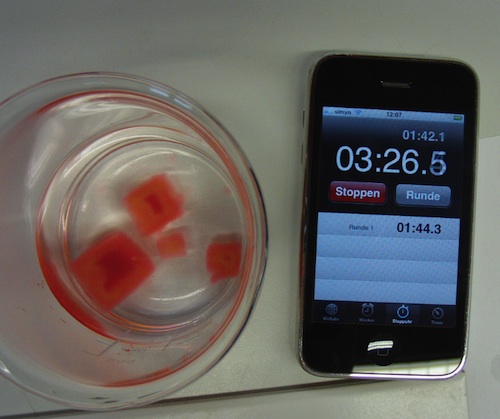Evaluation
 In the evaluation, the student is expected to put the conclusion into the context of the original aim. Does the conclusion support the student’s original thinking which was explained in the Exploration section using subject knowledge?
In the evaluation, the student is expected to put the conclusion into the context of the original aim. Does the conclusion support the student’s original thinking which was explained in the Exploration section using subject knowledge?
If the data does not support an hypothesis or an answer to the research question, the limitations of the method can be discussed and suggestions made about how the method could be improved to enable the collection of data that could help draw a stronger conclusion.
If it does support the original thinking then the variability of the data can be mentioned to support a statement about the reliability of the data, and the level of confidence this gives about the conclusion.
In the evaluation the focus is on the strengths and limitations of the method as well as suggestions how to improve these limitations. Unanswered questions arising from the investigation can make excellent proposals for extending the study.
Evaluation: conclusions, data and theory.
A good conclusion will begin with a description of the trends shown in the data. Link these relationships to the research question using phrases like this,
“The data support the hypothesis that the smaller the agar cube is the faster it decolourises."
"The graph clearly shows that cube size is inversely proportional to the distance travelled.”
Connect the theory mentioned in the background information of the exploration to the trends shown in the data analysis.
Evaluation: strengths weaknesses and improvements.
This section should be a short discussion showing that you understand what has worked well in the investigation.
For example,
"There are sufficient raw data to allow a calculation of the standard deviation, which has improved my confidence in the conclusion."
Mention where there were unavoidable problems and consider, the data, the apparatus, the methodology, and all the different types of errors. Beware not to say that, "human error caused the results to be unreliable." If you made a mistake in the investigation you are expected to restart that particular test and follow your method properly.
For each weakness suggest a specific way to address that problem. Be specific, and give details. "Collect more data" is not specific, this would be better,
"There was insufficient data. It would be better to collect ten repeats of each experiment so that the average would be more precise and a standard deviation could be calculated to help decide whether there was a difference between species A and species B."
| EVALUATION | ||||
| Conclusion data | Conclusion theory | Strengths and weaknesses of the investigation, such as limitations of the data and sources of error, are | Realistic and relevant suggestions for the improvement and extension of the investigation. | |
| 6 | Described in detail and justified, entirely relevant to the RQ fully supported by the data. | Justified through relevant comparison to the accepted scientific context. | Discussed and provide evidence of a clear understanding of the methodological issues involved in establishing the conclusion. | Are discussed. |
| 4 | Described, relevant to the research question and supported by the data. | Some relevant comparison to accepted scientific context. | Described and provide evidence of some awareness of the methodological issues involved in establishing the conclusion. | Some described. |
| 2 | Outlined but may not be relevant to the research question or may not be supported by the data. | Erroneous or superficially compared to the accepted scientific context. | Outlined but are restricted to an account of the practical or procedural issues faced. | Very few outlined. |
| 0 | Standard not reached. | Standard not reached. | Standard not reached. | Standard not reached. |

 IB Docs (2) Team
IB Docs (2) Team
